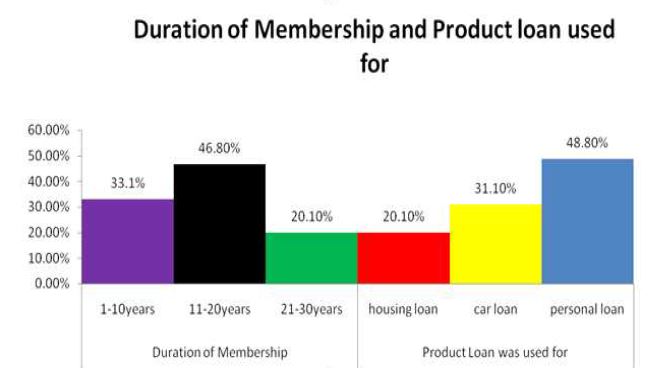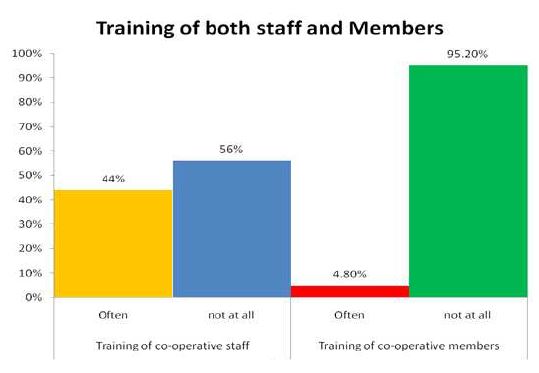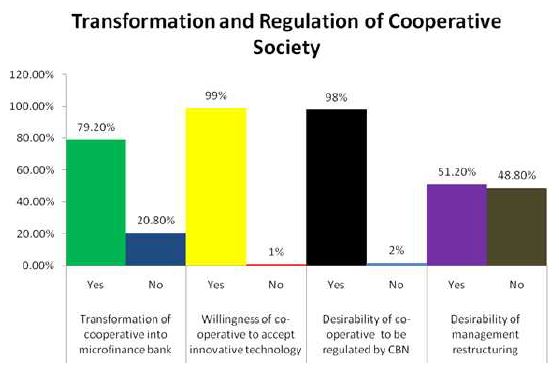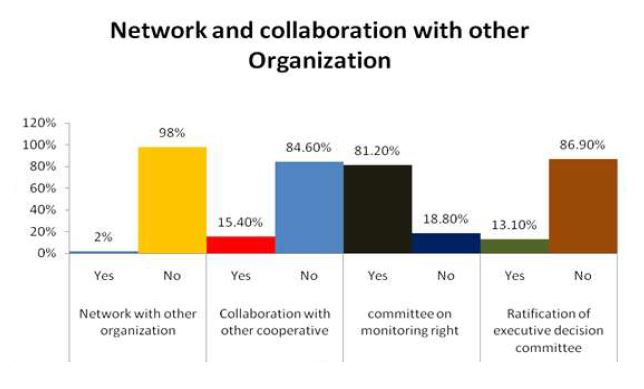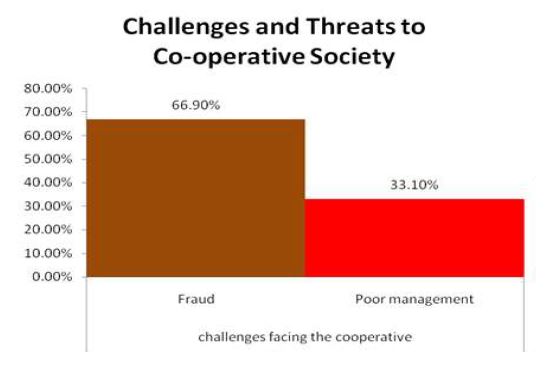
Relationship Between Co-operative Society Governance And Members Satisfaction: A Case Study of the Ambrose Alli University Workers/Farmers Multi-Purpose Cooperative Society, Edo State, Nigeria
Abstract
The study examines the relationship between co-operative society governance and members’ satisfaction. Co-operative societies face problems of how to keep balance between efficiency and governance because those in charge of operations of co-operative; the board and the staff must meet two demands i.e. good business practice and the social responsibility which involves the satisfaction of members. The objective of this study is to examine the relationship between co-operative governance and members’ satisfaction using Ambrose Alli University Workers/Farmers Multi –Purpose the Co-operative Society as a case study. The data collected in this study were obtained through structured questionnaire. Data analyzed were subjected to descriptive statistics and graphs. The data analyzed indicated that the challenges facing the co-operative society include theft /fraud and mismanagement. Members agitated for transformation of the co-operative society to operate in line with the guidelines of the Central Bank of Nigeria. It was recommended that for efficiency and high productivity, staff should be trained. Also there is need for innovative technology and the necessity for the cooperative society in question to network with other organizations.
Keywords:
Co-operative Society, Governance, Innovative Technology, Monitoring Right, Training1. Introduction
The International Co-operative Alliance (1995) defined a co-operative as an “autonomous association of persons united voluntarily to meet their common economic, social, and cultural needs and aspirations through a jointly owned and democratically controlled enterprise.” Co-operatives are established by people with similar thought process especially the cultural and economic background to meet their economic interests. Ijere (1981) contended that co-operatives are established to play important roles in the provision of services that would enhance agricultural development in Nigeria. The author opined that regular and efficient performance in agricultural services will accelerate the transformation of agriculture and rural economy in Nigeria.
Co-operative society is seen as a business organization where persons come in willingly and associate together on the basis of justice, fairness and equity and to promote similar economic interest (Misra & Puri, 2008). According to Helms (2005), co-operative society is an association of persons who have voluntarily come together to pursue a common goal through the formation of a democratically led enterprise, making equitable contribution to the capital required and having fair share of the risks and benefits as active members. On the other hand, Nafziger (2006) opined that a co-operative society is a voluntary association of persons having mutual ownership in providing themselves the needed economic benefits:nonprofit benefits through organized legal system that would enable them accomplish their objectives through joint participation of members.
Nigerian economy has a lot of potentials for development and growth because of the abundant natural and human resources available. The human and natural resources need to be harnessed to the fullest for the general well being of the citizens of the country. One way to realize this goal is through the encouragement of co-operatives movement in the country (Ayanwu et al., 1997). In Nigeria, Co-operative societies focus mostly on individuals who wish to start or expand their businesses and also medium and small scaleenterprises (MSE) to better their activities or businesses and their socio-economic prospect (Agbasi, 2010). It is the process of developing and sustaining economic growth, poverty reduction and facilitating job creation through promoting community spirit, identity and social organization (Gertler, 2001).
A study by Manap and Tehrani (2014) noted series of methods co-operative societies use to effect changes in the area of economic development of the country such as; building of market stores, recreation centers, health centers and creation of jobs opportunities. Thus, co-operative societies promote the fullest participation of all people and facilitate equitable distribution of the benefits of globalization. According to Levin (2002), co-operative societies contribute to sustainable human development and play a vital role in fighting against exclusion to economic development, this is a key factor in the promotion of national, international economic and social development of a country.
Co-operatives all over the world face one challenge or the other: ideology, capital, credibility and management, cultural transformation, competition, expansion, wage, solidarity, centralization, reorganizat ion and programmes to increase productivity and participation (Taimni, 1997). In another development it was posited that co-operative societies face problems of how to maintain the balance in two areas of co-operative business namely, efficiency and democracy, because those in charge of operation of co-operative societies especially the board and staff need to display the necessary attitude to achieve the goals of the organization (Grove, 1985).
Abell (2004) identified yet another challenge; that is the problem of training and retraining of members and officers in cooperative societies especially in developing countries. The author noted that a co-operative society without strong component of education is likely to face the danger of losing essential character, that is, the human and personnel traits which differentiate them as a co-operative societies. Nwankwo, Ewuim, and Asoya (2012) identified lack of proper management as a major challenge facing co-operative societies in Nigeria particularly in the area of quality of leadership which is a sine qua non for steering cooperatives to their target destination.
Cooperators satisfaction is seen as the total evaluation derived from purchase and consumption from goods and services within specific period of time, (Aderson, 2004). The author maintains that the quality of goods and services rendered to customers determines their satisfaction. And the customers should be given opportunity to express themselves especially when it comes to their demands so that they can come again. Anderson (2004), opines that cooperators satisfaction comes from the perception of cooperators’ expectation being met. Cooperators’ satisfaction consists of sales, services, profits and dividend shared. In this context cooperators’ satisfaction consist of dividend and access to credits and goods and services. When the product purchased meets the expectation of the cooperators it encourages them to come back again for additional products after fulfilling their first obligation. The research question therefore; are members satisfied by the governance structure of the Ambrose Alli University Workers/Farmers Multi –Purpose Cooperative Society? The research objective is to examine the relationship between the governance structure of Ambrose Alli University Workers/Farmers Multi –Purpose Co-operative Society and members’ satisfaction.
2. Theoretical and Literature Review
Cooperative society governance and members satisfaction are examined by employing the agency theory (Jensen & Meckling, 1976). Agency theory explains how the relationship between the principals and the agents can be maximized. The authors maintain that principals delegate the day to day activities or business to the committee members who are the shareholders and agents (Clarke, 2004). Daily, Dalton, and Canella (2003) identify two factors that influence the agency theory. First, the theory is conceptually simple and reduces the cooperative into two participants: managers and shareholders. Second, agency theory suggests that employees or managers in the organization can have self-interest and goals (Haslinda & Valentine, 2009). In the agency theory, the shareholders expect the agents to act or work and make decisions in the principal’s interest while, on the contrary, the agents may not necessarily or willingly take decisions in the interest of the principals (Jensen & Meckling, 1976). Certainly, what should be noted is that the problem arising from the separation of ownership and control in agency theory has been confirmed by several scholars including Davis, Schoorman, and Donaldson (1997). Scholars claim that in the agency theory, the agents may succumb to self-interest and opportunistic behavior, thereby falling short of achieving the principals’ goals and needs.
However, the agency theory was introduced basically as a separation of monitoring, ownership structures, and control (Bhimiani, 2008). From the agency theory perspective, insight can be offered into how obtaining control of critical resources offers better services to members. This study therefore applies agency theory to explain members satisfaction base. While the governance perspective of agency is to design controls that enforce compliance (Nkundabanyanga, 2016); the ability of an organizatio n to cope, survive, grow, and maintain business success is related to the monitoring rights, ratifications of management decisions, and innovations to accomplish better services. This is also shared by Haslinda and Valentine (2009) who contended that governance must constitute a goals structure that provides for the needs or goods of the shareholders which change the monitoring and innovation that enhance members satisfaction.
The epistemology of monitoring concept indicates that it is derived from cooperative governance (Dasgupta & Serageldin, 2000). Monitoring rights in cooperatives are the processes of overseeing the activities and operations of cooperative societies. This procedure makes members of cooperative societies gain confidence that their co-operative society is operating and managed for their uttermost benefits. Monitoring in cooperative society is predominantly task of management committee members who are elected at annual general meetings to steer the society to success and to ensure development. The management committee has tasks such as being responsible for ensuring excellence, organizing and handling of operations while the management committee’s actions involve team-building and to satisfy members’ needs. Therefore, the presence of good governance in cooperatives societies brings about members satisfaction and membership growth (Ben-Ner & Van Hoomissen, 1991; Hansmann & Kraakaman, 2001).
Good cooperative governance leads to effective monitoring of activities of a society which enhances social performance (Djankov et al., 2007). Cooperative governance regulates the relationship between members of cooperative and committee representatives. In this regard, control and supervision by committee members are key functions of cooperative governance. Therefore, accommodating the interests involved, streamlining differences between expectations of groups including owners, guiding and monitoring the managers are the main concerns of governance, leading to more transparent relationship, risk reduction and improvement of security in the system of organizations.
Ratification of management decisions includes resolutions that have been implemented prior to the general meeting. The ratification process brings about self-assurance of society members that their management holds wide consultation and care for members (Dasgupta & Serageldin, 2000). In addition, the order of ratification provides opportunities to the executive management to explain why timely approval is necessary for members. These new approaches in businesses help members to appreciate the services rendered which promote members’ satisfaction. Moreso, the executive committee retains formal ratification and monitoring rights which are very crucial for members’ satisfaction and confidence (Gianviti, 2005).
Innovative technology or services promote members’ social responsibility and quality services that could lead to members’ satisfaction. The reason behind innovation is to bring in new approach of delivering services to members such as distribution of inputs, loans and repayments which can now be done through mobile transactions. Cooperative businesses have a policy framework that supports employees and members to be innovative and creative by producing something fresh to promote social responsibility within the society. Birchall (2003) and ICA (1995) contended that good governance system can create innovative approach, enable cooperatives to continue to be important means of achieving economic security and improve standard of living. Schumpeter (1934) was the first to establish a linkage between enterprises and innovation in theory. The author noted the crucial role of innovation as it contributes to growth of the economy. Bygrave and Timmons (1992), Legge and Hindle (1997) held similar view that innovation is a change of state, a dynamic process and a unique event that could promote the successes of cooperative societies.
A sustainable policy framework for, co-operative societies in developing economies is very necessary. it will assist to create a large and vibrant co-operative sector. According to Mwanja et. al. (2014), non-compliance with co-operative dictates and other policies affect co-operative performance. The authors maintain that policy compliance ensures that guidelines are followed when taking decisions for the well-being of members particularly where the utilization of co-operative funds is involved. According to Kobia (2011) policy adjustment helps in introducing new methods toward quality services to members. It has been noted that sound governance, risk management and compliance discipline can enable co-operators to integrate inefficient, isolated processes and systems into effective and efficient co-operative societies.
3. Research Methodology
This section of the study discusses the data collection process and method in assessing the level of satisfaction derived by cooperators from services rendered by the executive of the cooperative society. The study was carried out in Ambrose Alli University Workers/Farmers Multi-Purpose Cooperative Society, Edo State, Nigeria. The cooperative society was established in 1991 with membership strength of two thousand nine hundred and twenty four (2,924) members.
The Multipurpose Cooperative Society finances are from shares/savings, loans and investment. Monthly savings is deducted from members’ salaries or given by cash where necessary. Loans are granted to member at the interest rate of 15%, for a period of twenty four months. Approval of all loans is strictly at the discretion of the executive. A member is only eligible for another loan only after full repayment of previous loan while the recovery period of a loan is a maximum of twenty four months and the recovery of loans is done by deduction from a member’s salary or by cash where necessary.
The research utilized survey design and the choice of this approach is because of its flexibility and wide coverage (Kothari, 2003). The underlying principles of this research are to ascertain the satisfaction level of co-operators based on the governance of the cooperative (executive committee members). Respondents were selected members and staff of the co-operative society.
There were twenty seven (27) questions asked participants including their socio demographic status. Other related questions were on duration of membership, product loan used for, executive management policy and satisfaction of their services by the cooperators, training of both staff and members, transformation and regulation of cooperative society, network and collaboration with other organization, social responsibility and social performance and the challenges and threats to cooperative society.
The sample size was randomly selected from the population of two thousand nine hundred and twenty four (2,924) and three hundred cooperators representing 9.7% were sampled and questionnaires were administered to them and two hundred ninety three (293) were retrieved from the respondents representing 98%. The questionnaire instrument consist of open and close –ended questions; some dichotomous, multi-choice questions in which the researchers provided a choice of answers. The dichotomous questions had only two response alternatives namely, yes or no. The data analyzed were subjected to descriptive analysis which has to do with the use of percentage (%) and graphs.
4. Data Presentation
4.1 Descriptive Analysis
Fig. 1 below shows that majority of the members of the cooperative were between 11-20 years, those that have been members for 1-10 years, 33.1% and 20.1% of the respondents have been members for 21-30 years. In terms of the products loans are used for, Fig. 1, reveals that the loan collected were spent on personal loans, 48.8%, car loans, 31.1% and housing loans 20.1% in that order.
Fig. 2 below shows that 48.8% of the respondents agreed that the executive management adhered to the policy of the cooperative while 51.2% said they did not adhere to the policy of the cooperative. On satisfaction of their services to the cooperators, 65.2% of the cooperators or respondents said No, meaning they were not satisfied with their services while 34.8 said yes that they were satisfied with their services. On the existence of legal department, 65.5% of the co-operators or respondents said that they do not have legal department in the cooperative while 34.5% of the respondents said yes, meaning there is legal department.
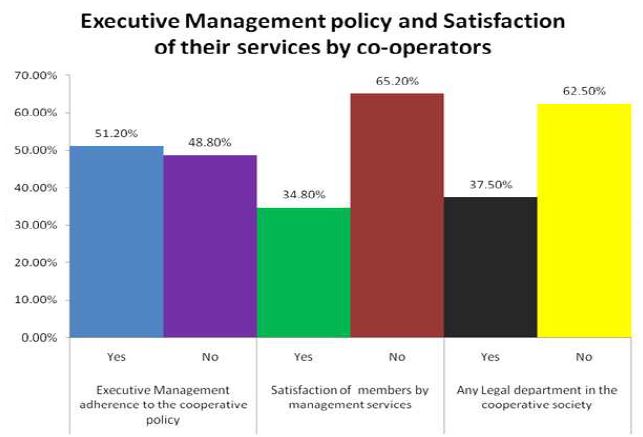
Executive Management policy and Satisfaction of their services by co-operators (Source: Field Survey 2020)
Fig. 3 below indicates that 44% of the respondents or cooperative staff often receive training while 56% of the staff or respondents indicated that they do not receive training. On training of members, 95.2% of the respondents said that they do not receive training at all while 4.8% of the respondents mentioned that they do receive training often.
Data from Fig. 4 showed that 79.2% of the respondents were of the view that their cooperative society should be transformed to a microfinance bank while 20.8% do not share the view or accept transformation. On the issue of willingness of the cooperative society to accept innovative technology, 99% of the respondents seriously agreed that new innovative technology be introduced in the operations of co-operative societies while 1% of the respondents disagreed. On the issue of regulation by Central Bank of Nigeria, 98% of the respondents agreed that it should be regulated while 2% of the respondents did not share the view of regulation by the Central Bank of Nigeria. On issue of restructuring of the management team, 51.2% of the respondents agreed to restructuring while 48.8% opposed - restructuring.
Data from Fig. 5 below indicates that the co-operative does not have network with other organizations. A total of 98% of the respondents said that there is no network while 2% of the respondents agreed that there are networks with other organizations. On collaboration with other cooperative societies, 15.4% of the respondents agreed that there is collaboration with other co-operative societies while 84.6% of the respondents said that there is no collaboration with other co-operative societies. On the issue of monitoring rights 81.2% of the respondents agreed that there is a committee on monitoring rights within the cooperative society while 18.8% of the respondents disagreed that there is a committee on monitoring rights within the cooperative society. On the issue of ratification of executive committee decisions, 86.9% of the respondents strongly disagreed that there is such committee while 13.1% agreed and said such a committee exists.
Fig. 6 below indicates that theft/ fraud and poor management are the major challenges and threat to the cooperative society. 66.9% of the respondents were of the opinion that fraud was a major challenge while 33.1% of the respondents disagreed.
5. Summary of Findings
In the agency theory, the shareholders expect the agents to act or work and take decisions in the principal’s interest. In this study it was observed that the agents which are executive and staff provide certain services and products for members’ satisfaction. However members are not satisfied with their services. From the study, the agents provide different forms of loan products for the cooperators and these are personal loans, car loans, housing loans and agricultural and educational loans. But from the study, it was revealed that the loans collected are spent mostly on personal needs 48.8%, car loans 31.1% and housing loans 20.1%. On issue of adherence to the policy of the co-operative to achieve members satisfaction, it was revealed that the agent (executive) adhered to the policy. 51.8% of the members agreed on the issue while 48.2% were of the opinion that they did not adhere to the policy of the cooperative. On satisfaction of their services (executive) to the cooperators, 65.2% of the cooperators said they were not satisfied with their services while 34.8 said yes that they were satisfied with their services. On the existence of a legal department to deal with members legal issues, 65.2% opined that there is no legal department within the co-operative management. From the data analysis it was observed that both the staff and members of the co-operative society have not been trained at all considering the importance of training in an organization and training enhances productivity that brings about satisfaction. Further, members were not satisfied with the activities of their agents (executive/staff) because of the level of theft /fraud, and this has led to agitation for new innovative technology that can track theft and fraud. Also, due to the high level of theft/fraud, members are agitated for transformation of the co-operative society to a microfinance bank so that it can be regulated by the Central Bank of Nigeria and through this members’ satisfaction could be achieved. From the study it was also observed that the co-operative society does not network and collaborate with other organization and it does not bring a new ideas that can assist the cooperative society to satisfy their cooperators. It was observed that most members clamoured for restructuring of the executive committee (management team) to bring about satisfaction to the co-operators. The greatest challenges identified by members confronting the co-operative society were theft/fraud by the staff and poor management. These have greatly hampered members’ satisfaction and these should be a major concern to every cooperative societies and researcher.
6. Conclusion and Recommendations
In conclusion, a sound policy implementation for strengthening cooperative systems should be encouraged since it is the channel through which cooperative societies can attain better performance. For this reason, cooperative should take initiative to provide a clear explanation and acceptable assurance that effective governance through regulation, networking, restructured management and new innovation, will improve efficiency in quality services which will give better benefits and enhance performances and members’ overall satisfaction.
Based on the above findings, the following recommendations are hereby made;
For co-operative members to be satisfied with the services of the executive management, innovative technology must be developed to track every transaction of cooperators for proper accountability. Innovation brings about new ideas and systems that enhance development and members’ satisfaction.
Co-operative activities should be regulated especially when members’ savings are involved. From our findings it was revealed that the greatest threat to the co-operative is theft/fraud and this can reduce co-operators’ confidence. If regulated, it will minimize the level of theft and fraud.
Staff and members of co-operative society should be trained to enhance effective performance that can promote cooperators satisfaction. Capacity building is very important in service delivery; training will bring in new innovations and ideas that will assist the staff and management for effective service delivery to their members.
There is need for co-operative society to have network with other organizations. It will broaden its scope. This can be done through networking, meetings, newsletters, emails and exchange of personnel.
Ratification committee outside the general assembly must be constituted to always ratify the decisions of the executive committee of the co-operative. This will help to bring about transparency and accountability in the system.
The Executive Committee that acts as Monitoring Rights Committee should be restructured to meet the modern trend of monitoring and to add value to the activities of the management by checking and verifying the financial and non-financial transactions in the cooperative society. The advancement of the delivery of committee reports is paramount to the overall performance of the co-operative society.
References
- Abell, P. (2004). Cooperative Movement, Encyclopedia Encarta 2004 Edition
- Agbasi, O. (2010). The Role of cooperative in entrepreneurial Development, in Nkamnebe, A. D. and Nwankwo, F. (eds.) Capacity Building in Management and Entrepreneurship for Sustainable Development, Nimo: Rex Charles and Patrick.
- Alianza cooperative Internacional. (1995). XXXI IC Acongress Manchester Agenda and Reports. Review of International Cooperation, 88, 22-23. https://books.google.com.ng/books?id=714_ngEACAAJ&dq=inauthor
-
Anderson, F. M. (2004). Customer Satisfaction and Shareholder Value. Journal of Marketing, 72-185.
[https://doi.org/10.1509/jmkg.68.4.172.42723]

- Anyanwu, J. C., A. Oyefusi, H. Oikhenam, & F. A. Dimowo (1997). “The Structure of the Nigerian Economy”. Joan Educational Publisher Ltd. Onitsha, Nigeria. pp 594-595.
-
Ben-Ner, A., & Van Hoomissen, T. (1991). Nonprofit Organizations in the mixed Economy. Annuals of Public and cooperative Economics.
[https://doi.org/10.1111/j.1467-8292.1991.tb01366.x]

-
Bhimani, A. (2008). Making Corporate Governance Count: The Fusion of Ethics and Economic Rationality. Journal of Management and Governance, Boston, 12, 135-147. https://EconPapers.repec.org/RePEc:kap:jmgtgv:v:12:y:2008:i:2:p:135-147, .
[https://doi.org/10.1007/s10997-008-9056-7]

- Birchall, J. (2003). Rediscovering the co-operative Advantage: Poverty Reduction through Self Help (pp.20-25). Geneva: ILO. Doi/full/10.1080/23311975.2017.1284391
- Bygrave, W. D., & Timmons, J. A. (1992). Venture capital at the crossroads. Cambridge, MA: Harvard Business Press.
- Clarke, T. (2004). Theories of Corporate Governance: The Philosophical Foundations of Corporate Governance. Manitoba: Routledge, Taylor and Francis Group: London and New York.
-
Dail, C. M., Dalton, D. R., & Canella, A. A. (2003). Corporate Governance: Decades of Dialogue and Data. Academy of Management Review, 28, 371-382. http://www.jstor.org/stable/30040727
[https://doi.org/10.5465/amr.2003.10196703]

-
Dasgupta, P. & Serageldin, i. (2000). Social Capital: A Multifaceted Perspective. Washington DC: World Bank. http://www.serageldin.com/Attachment/xzNufO9URZ_20150209150531352.pdf
[https://doi.org/10.1596/978-0-8213-5004-1]

-
Davis, J. H., Schoorman, F. D., & Donaldson, L. (1997). Towards Stewardship Theory of Management. Academy of Management Review, 22, 20-27.
[https://doi.org/10.5465/amr.1997.9707180258]

- Djankov, S., Qian, Y., Roland, G., & Zhuravskaya, E. (2007). What makes a successful Entrepreneur? Evidence from Brazil. Washington DC. World Bank. Working Paper No 104. https://www.nes.ru/files/Preprints-resh/WP104.pdf
- Gertler, M. (2001). Rural Cooperative and Sustainable Development, Saskatoon SK: Centre for the Study of Cooperatives, University of Saskatchewan. https://www.researchgate.net/publication/23520553
- Gianviti, F. (2005). Economic, Social and Cultural Rights and the International Monetary Fund. Washington DC: International Monetary Fund. https://www.imf.org/external/np/leg/sem/2002/cdmfl/eng/gianv3.pdf
- Grove, F. (1985). What is Cooperative? The Philosophy of Cooperation and its Relationship to Cooperative Structure and Operations, Madison: UWCC Occasional paper No. 6. https://www.researchgate.net/publication/46446457
-
Hansmann, H. & Kraakman, R. (2001) ‘The End of History for corporate Law,’ Georgetown Law Journal, 89, 439–68. Google Scholar
[https://doi.org/10.2139/ssrn.204528]

- Haslinda, A., & Valentine, B. (2009). Fundamentals and ethics theories of corporate governance. Middle Eastern and Economics, 4, 88-96. http://www.Eurojournals.com/MEFE.htm
- Helms, J. E. (2005). Challenging some misuses of Reliability in Studying White racial Identity. In R Carter (ed), Handbook of racial –cultural Psychology and Counseling, 1.360-390. Hoboken, NJ: Wiley. https://dergipark.org.tr/tr/download/article-file/174011
- Ijere, M. O. (1998). Agricultural Credit and Economic Development. In: Ijere, M. O. Okorie, A. (ed) Readings in Agricultural Finance. Longman Lagospp. 4-9
-
Jensen, M. C., & Meckling, W. H. (1976). Theory of the Firm: Managerial Behavior, Agency Costs and Ownership Structure. Journal of Financial Economics, 3, 305-360. North-Holland Publishing Company. https://www.sciencedirect.com/science/article/pii/0304405X7690026X
[https://doi.org/10.1016/0304-405X(76)90026-X]

- Kobia, S. K. (2011). The Co-operative movement in Kenya: Challenges and Opportunities. Nairobi: Lukiko Consulting Trust. https://www.worldcat.org/title/co-operative-movement-in-kenya
- Kothari, C. R. (2003). Research Methodology: Methods and Techniques. New Delhi: WishwaPrakashn. https://www.academia.edu/33779875
- Kotler, P. (2009). Marketing Management. USA: Prentice Hall Publication Inc.
- Levin, M. (2002). The Promotion of Cooperatives: ILO Cooperative Branch. https://www.ica.coop/europe/ra2002/speech.
-
Manap, N. A., & Tehrani, P. M. (2014). The Contribution of cooperative Law to Economic Development in Malaysia. Asian Social Science, 10(15), 283-290. DOI: 10.5539/ass.v10n15p283.
[https://doi.org/10.5539/ass.v10n15p283]

- Misra S. K., & Puri, V. K. (2008). Indian Economy. Publishing House, 26th Edition, New Delhi. https://www.academia.edu/1968006/Indian
- Mwanja, B. K., Marangu, W. N., Wanjere, D. M., Kuria, J., & Thuo, K. J. (2014). Effect of corporate Governance on Performance of Savings and Credit co-operative Societies in Kakamega county. European Journal of Business and Management, 6, 123-136. https://core.ac.uk/download/pdf/234625845.pdf
- Nafziger, E. W. (2006). Economic Development (4th edition), New York: Cambridge University Press: New York.
-
Nkundabanyanga, S. K. (2016). Board of Governance, Intellectual Capital and Firm Performance: Importance of multiplicative Effects. Journal of Economic and Administrative Sciences, 32, 20-45.
[https://doi.org/10.1108/JEAS-09-2014-0020]

-
Nwankwo, F., Ewuim, N. & Asoya N. P. (2012). Role of Cooperatives in Small and Medium Scale Enterprises Development in Nigeria: Challenges and the Way Forward. An International Multidisciplinary Journal, Ethiopia 6(4), 140-156. https://www.academia.edu/29055331
[https://doi.org/10.4314/afrrev.v6i4.10]

- Schumpeter, J. A. (1934). The Theory of Economic Development: An Inquiry into Profits, Capital, Credit, Interest, and the Business Cycle. New Brunswick, NJ: Transaction Publishers. https://www.researchgate.net/publication/272398717
- Taimni, K. K. (1997). Cooperatives in the New Environments: A Study of the Role of the Registrar of Cooperative Societies in Selected Countries in Asia, Rome: FAOUN. https://mpra.ub.uni-muenchen.de/23161
Asemota Abel Ekhorutomwen is a senior lecturer at the Ambrose Alli University. Email: asemotaabel2@yahoo.com
Ojeakeri Benson Peters is a senior lecturer at the Ambrose Alli University. Email: ojealarobensonpeters@yahoo.co.uk
